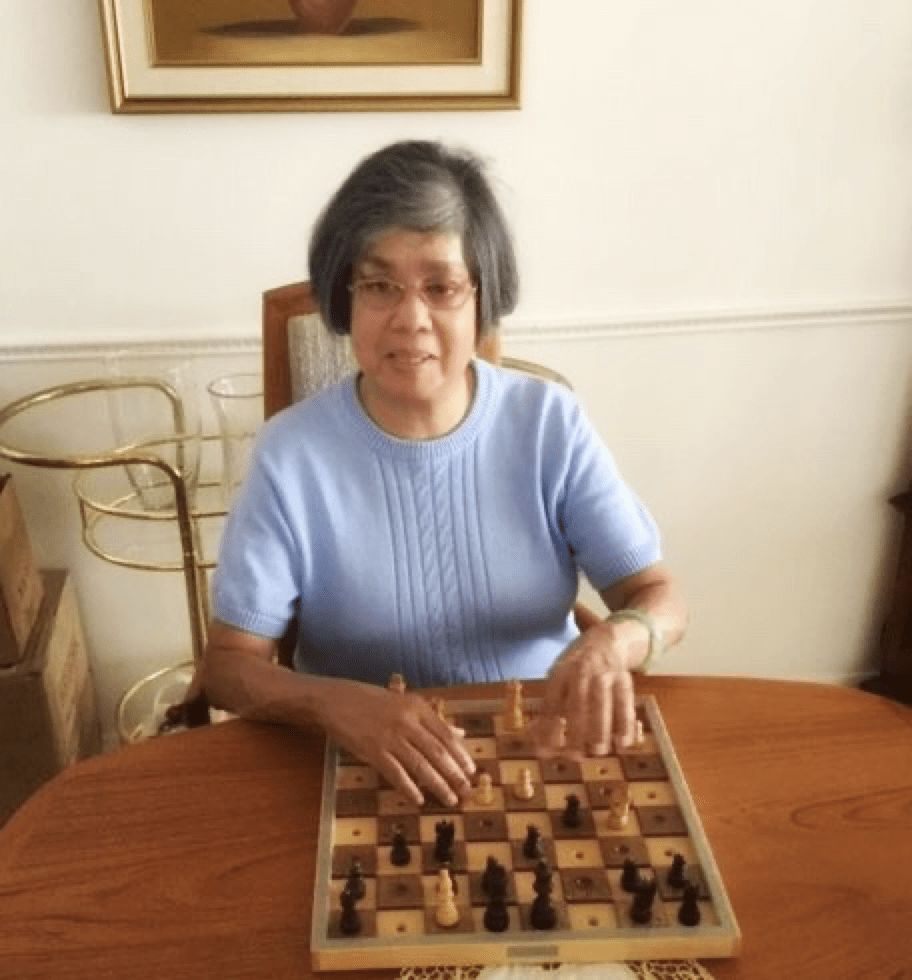
Blind Chess: It's More Than Just A Game
Written By Olya Kaye
There are extraordinary people out there like GMs Magnus Carlsen, Hikaru Nakamura, Bobby Fischer, Judit Polgar, and her sisters who took an ordinary game of chess to the next level. They have inspired the world, changed the game, and brought more public interest to chess.
And then there are more ordinary people that the world has not heard of that do extra-ordinary things with the same game. Meet Donna Jodhan. If you ever struggled to learn or to keep up with your chess, imagine doing it with your eyes closed.

Donna is visually impaired, but that did not stop her from taking up the game back in 2003, while in her 40s. She is a true inspiration not just for visually impaired people, but to all chess players. Below are some of the insights into what it is like to be a chess player while having no vision and how chess is helping Donna to stay connected and be socially active.
Background
Donna was born with very limited vision, where she could only see things close up. She could differentiate between light and dark, identify bright colors, shadows, and shapes. But her vision was too weak to be able to read, write, see images or faces.
However, when Donna was a teen she received a cornea transplant that enabled her to see a whole new world! She learned to read and write, ice skate, play basketball, and much more. But the most magical part of it all was the moment when she discovered she could see the faces of her parents for the first time, after all of these years. It was a highly emotional moment filled with joy and disbelief.
Years later, Donna’s vision started to deteriorate again. In 2004, Donna suffered a horrific retinal detachment which left her almost totally blind, which she is still to this day. Once again, Donna had to learn to adapt to new circumstances and use her memories to ignite her imagination, stay positive and carry on with life. Today, she uses computers equipped with adaptive software and devices with voiceover. And, of course, Braille.
A Note On Blindfold Chess

“Every now and then, I go out to take my garbage and as I walk down the hall,” says Donna, “I sense someone standing near the elevator. I say 'good morning' and the person sheepishly asks 'how did you know that I am standing here?' To that, I respond that it is because I either smelled his aftershave or her perfume, or simply sensed his or her presence.”
Just like being blind can awaken and sharpen other senses, all chess players can also benefit from playing blindfold chess. The main benefit of blindfold chess is that it enhances focus, memory, and visualization skills. Those who practice blindfold chess will notice that they will blunder fewer pieces in their "on board" games. They will also be better able to remember where all their pieces are on the board and what their interactions are. As Hellen Keller said: “The only thing worse than being blind is having sight but no vision.”
The only thing worse than being blind is having sight but no vision.
— Helen Keller
Interview with Donna
Question: When did you decide to learn to play chess and why?
Donna: Learning to play chess was always on my mind. I purchased my very first adaptive chessboard and instructional manual in Braille back in the 1990s. But it was only after I met chess coach Nadia Chichkina in 2003, when I still had some of my vision, that I became serious in pursuing the game. I decided to play chess in order to develop my thought process and patience and to help me become more confident when making decisions and strategizing. I had no idea at the time that a year later, I would lose all of my vision again and that chess would be one of the means that would flourish my social life down the road.
Q: How do you manage to learn and to play chess when you cannot see the board and pieces?
D: There are chessboards for people who are blind and visually impaired that are especially adapted. The white squares are raised and the black squares are sunken. The black pieces are distinguished from the white by having a dot placed on their tops. The good thing about these chessboards is that sighted players can use them as well and, as such, can easily play against blind people.
I take my lessons over email and skype with my new coach, Mark Kirkhamand, who walks me through the material. He tells me what chess position to set up on the board and then I try to find the best moves. It is not easy to keep various chess positions in your head, but that type of training has tremendous benefits on visualization and it gets easier with time.
Q: You mentioned that chess is much more for you than just a game. Can you please tell us more?
D: Yes! I have had the opportunity to play with other people from England, Ireland, France, the United States, and Canada. I love to socialize with my competitors via email. I get to learn about their countries, their hobbies, their lives, and so much more. I enjoy sharing my experiences with others. It is the social connection I get through chess that keeps me interested in getting better at the game.
At this time of COVID-19 I have discovered that like me, we all share similar fears, hopes, concerns, and much more. When COVID is finally gone, I hope to visit England again to attend a family reunion and to personally meet some of my chess friends from across the pond. (Donna currently resides in Canada).
Q: What are your personal accomplishments in chess?
D: For me, it’s not about how many tournaments or trophies I win. It is all about becoming a stronger and better self. Thanks to chess, I am a lot better at controlling my emotions and am more mentally flexible. I am able to strategize in a better way and I am able to better analyze and understand every side of problems and challenges that I face. And trust me, being visually impaired poses a whole set of challenges and obstacles that sighted people don’t even have to think about.
Thanks to chess, I am now more resilient and it carries over to my professional side. I often depend on chess strategies to help me formulate and make decisions.
Thanks to chess, I am now more resilient and it carries over to my professional side. I often depend on chess strategies to help formulate and make decisions.
— Donna Jodhan

Q: If you could give advice to people struggling to learn to play the game, both for those who are visually impaired and those who have perfect vision, what would it be?
D: It's all about patience, persistence, and being prepared to lose more than just a few times. Start off with friendly games and build from there. Don't take the game too seriously, at least at the beginning, or you could be set up for disappointment. Be committed and take time to concentrate. Learn from those who are stronger than you.
I think that chess is one of the best ways to develop mental strength and concentration because it is not an easy game. However, the rewards one reaps from being a chess player go a long way.
Q: Is there anything you wish the chess world could offer more of to visually impaired people?
D: Yes. I envision a world with more opportunities for blind players to play against sighted opponents. Today, visually impaired people can often feel like they are left out; like they are not part of the rest of society. There are so many things we are unable to do simply because the world is not designed to properly account for and accommodate people with vision impairment. But we want to be a part of it all.
I would love to see more children with sight impairments encouraged to learn to play chess. It would really open up a whole new world of possibilities for them. I would love to see these children integrated with sighted kids for socialization purposes both on and off the chessboard. I would love to see one more vision impairment barrier taken down. In this way, children would get to know each other and become more comfortable with each other to the extent that there will be very few differences among them.
There should be more awareness that chess can be played by people with vision impairments. There should be more demonstrations of the adapted chess boards and pieces. The main objective of this would be to build relationships among sighted and vision-impaired players. We can all learn so much from each other!
Parting Notes
Donna has been heavily involved in her community since 1998. She is the founder and chair of Barrier-Free Canada and is "passionate about making the world more accessible for the children of tomorrow. She works on removing barriers to education and job opportunities. In 2000, she started a charter challenge with the Federal Government to ensure that Canadian government websites are accessible to persons with disabilities, which culminated in a landmark victory in 2012. Donna is a motivational speaker, presenting to academic and professional audiences across Canada.”
In March 2020, she started to relinquish most of her advocacy initiatives but her undying commitment is to work to ensure that children with a disability would be able to enjoy a bigger and brighter future. To this end, she continues to advocate, teach, and mentor them. She also remains committed to advocating for seniors with sight loss—as seniors, as a whole, are often forgotten and left behind.
Donna’s parting comment is as follows: “Being a trailblazer in my own way has been fun, but at the same time it has also been sprinkled with frustration, heartache, and moments of tremendous sadness and disappointment. But I truly hope that there are people out there who will relate to my story. I hope they will find courage and lots of fun things to do in life, be it chess or any other hobby, to keep calm and to carry on. And I truly hope that one day, the chess community will witness one less barrier among people of all capabilities.”
I truly hope that one day, the chess community will witness one less barrier among people of all capabilities.
— Donna Jodhan
Try It Yourself
For those who are interested to try a blindfold game on Chess.com, it is easy to set up. Go to Chess.com/board/settings, where you can select "blindfold" for your pieces style, and you will be ready to try out a game without seeing the pieces. For more information about blindfold chess, see here.



